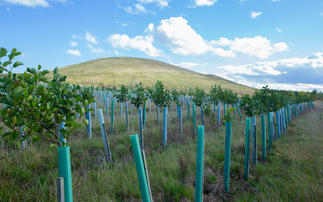'A brave, brilliant and committed environmental campaigner, and a good friend'
The UK's environmental movement lost one of its most talented, tenacious, and longest-serving campaigners last week, with the death of Lord Peter Melchett aged 71.
The environmentalist, farmer, and Labour politician was an integral figure in the expansion and growing prominence of Greenpeace UK during the 1980s and 90s, as well as one of the UK's foremost campaigners for organic farming methods.
He is perhaps best known for his role in a series of high profile protests during the 1990s. He was arrested in Norfolk in 1999 when a group of protestors destroyed a crop of genetically modified maize, which was being grown in a pilot project. In a crucial test case the group was acquitted after arguing the protest was justified on the grounds they feared the crop would pollute the environment.
The protest brought condemnation from advocates of GM crops, but also helped cement public concerns over the issue and highlighted how direct action environmental protest could have an outsized impact in the emerging era of rolling news.
Speaking to Sue Lawley on Desert Island Discs in 2000, Melchett argued protest was essential, but it had to draw on and build public support. "You only win a campaign if people support you and people will only support you if you're right - if what you're saying is correct or if what you predict turns out to be the case," he said.
Melchett served as first chairman and then executive director at Greenpeace from 1986 to 2001, where he played a key role in a wide range of campaigns covering everything from whaling to nuclear waste. Crucially, he was also central to successful efforts to highlight the risks associated with CFCs and push companies to develop and adopt alternative technologies.
After Greenpeace he joined the Soil Association in 2002, where he worked until his death as policy director and was able to combine his love of sustainable farming on his family farm in Norfolk with a raft of successful campaigns to raise awareness of green farming practices.
He also worked with the private sector to help advance effective sustainability strategies, advising companies such as Ikea, Iceland and Asda. And he undertook a host of voluntary roles, advising other campaign groups and sitting on the BBC's rural affairs committee, the Department of Education's school lunches review panel, and the EU's Quality Low Input Food initiative, among other projects. He was to receive an honorary doctorate from Newcastle University in 2013.
Born in 1948 in London, to Sonia and Julian Mond he was raised in Norfolk before attending Eton and studying law at Cambridge. He became the fourth Lord Melchett in 1972 following the death of his father, although he would later vote against hereditary peerages. He took the Labour whip in 1974 and became a junior Environment Minister in the Wilson government, before also serving as a Minister in the Department of Industry and a Minister for Northern Ireland, during which time he led legislation to enable non-sectarian schools.
He stepped back from frontline politics in the 1980s and dedicated his time to civil society groups, working with the National Association of Youth Clubs, the Ramblers Association, Friends of the Earth, WWF UK, and Friends of the Earth among others.
Friends and colleagues last week paid tribute to Melchett, describing him as a fearless campaigner and a constructive voice in the search for environmental solutions.
"In Peter's 12 years campaigning at Greenpeace he was both fearless in taking on big corporations like BP and Monsanto but also pioneering in supporting solutions like Greenfreeze refrigeration to save the ozone layer," said John Sauven, executive director at Greenpeace UK. "We all live a little bit more peacefully with the earth and its animals as a result of his efforts. A true radical and campaigner to the end."
Sauven's comments were echoed on Twitter by Sir Jonathon Porritt, who said he was "feeling so sad" at the news of Lord Melchett's passing. "Peter was a consummate campaigner (at Greenpeace and Soil Association), a wise and compassionate advocate for everything that really matters, and a true friend," he wrote.
Zac Goldsmith MP described him as "a brave, brilliant and committed environmental campaigner, and a good friend", adding that he will be "hugely missed".
Broadcaster Monty Don said his "kindness, wisdom and sheer right- mindedness was a privilege to know", while Stephen Fry joked warmly that "he was called Lord Melchett and he came from Norfolk. A great man therefore".
Lord Melchett's friend Elizabeth Buchannan, who is also a non-executive board member at the Department for Environment, Food and Rural Affairs, told the BBC of "an establishment figure who became a radical campaigner".
"He was an extraordinary person but he had such credibility because he was actually farming himself in Norfolk so he wasn't' just pontificating, he was doing and he was proving how you can farm in a different way," she said. "He held these views and did these things while at all times being a true gentleman... gentle and kind while also being brave and passionate.
He is survived by his partner of 45 years, Cass Wedd, their two children, Jessie and Jay, and four grandchildren.






